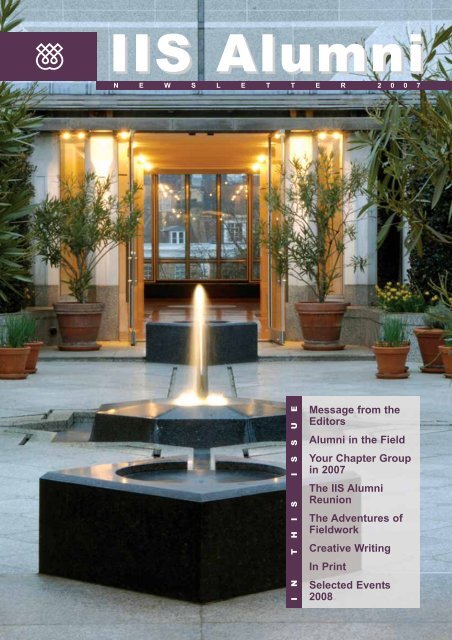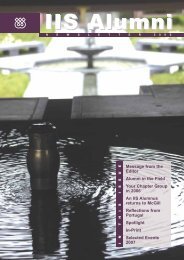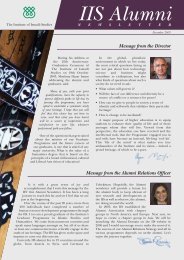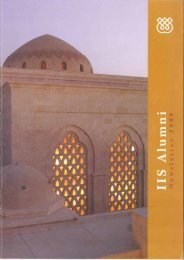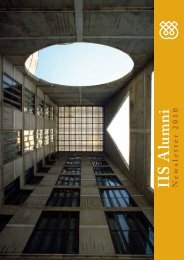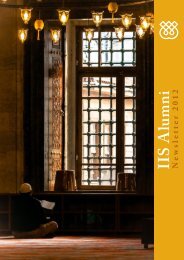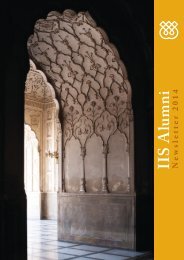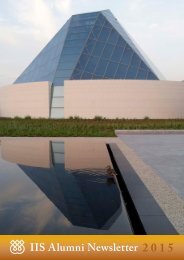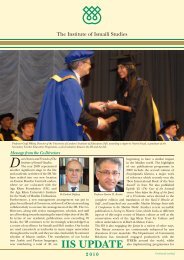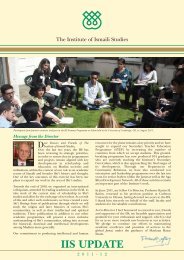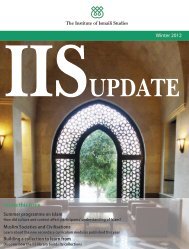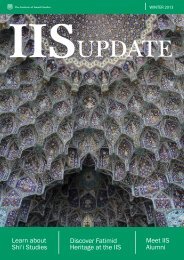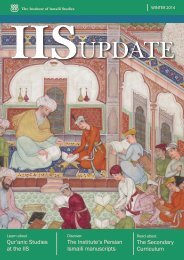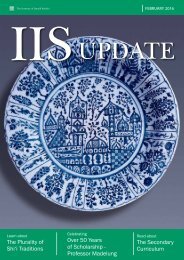Create successful ePaper yourself
Turn your PDF publications into a flip-book with our unique Google optimized e-Paper software.
<strong>IIS</strong> <strong>Alumni</strong><br />
N E W S L E T T E R 2 0 0 7<br />
I N T H I S I S S U E<br />
Message from the<br />
Editors<br />
<strong>Alumni</strong> in the Field<br />
Your Chapter Group<br />
in <strong>2007</strong><br />
The <strong>IIS</strong> <strong>Alumni</strong><br />
Reunion<br />
The Adventures of<br />
Fieldwork<br />
Creative Writing<br />
In Print<br />
Selected Events<br />
2008
We are delighted to bring you the third <strong>IIS</strong> <strong>Alumni</strong> <strong>Newsletter</strong> showcasing the<br />
talents and activities of our diverse alumni body. <strong>2007</strong> has proven to be an<br />
eventful and productive year for the <strong>Alumni</strong> Relations Unit at the <strong>IIS</strong> and the<br />
individual Chapter Groups in which we have reached out to increasing numbers of<br />
alumni across the globe.<br />
Message<br />
from the<br />
Editors<br />
This year, the <strong>Alumni</strong> Relations Unit saw the departure of the <strong>Alumni</strong> Relations<br />
Co-ordinator, Selina Kassam Ramji, who has worked in alumni relations at the <strong>IIS</strong><br />
since its inception. Selina has moved to the <strong>IIS</strong> Department of Community<br />
Relations where she has taken up the post of Education Co-ordinator. We would<br />
like to take this opportunity to acknowledge and thank Selina for all the work she<br />
has undertaken in years past and express our hope that she remains an active<br />
member of the <strong>IIS</strong> <strong>Alumni</strong> Association. In November, Nazneen Sachedina joined<br />
the unit as our new <strong>Alumni</strong> Relations Officer. Nazneen is looking forward to all the<br />
opportunities and challenges this position will afford her, and the chance to build a<br />
strong relationship with the alumni body globally.<br />
The Chapter Groups have had a busy year with the elections, annual meetings<br />
and other local and regional programmes as well as making their plans for 2008.<br />
Earlier in the year, the Asian and European Chapters held their first annual<br />
meetings in Mombasa and London, respectively, and the North American Chapter<br />
held its second annual meeting in Toronto. We were delighted that so many alumni<br />
were able to participate in these events, and hope that in future years these<br />
numbers will continue to rise. We would like to thank the individual Presidents and<br />
Secretaries for all their hard work in <strong>2007</strong> and trust that they have found their<br />
experiences, though challenging, to be both rewarding and worthwhile.<br />
In September, the <strong>IIS</strong> hosted its second alumni reunion in London. Nearly 100<br />
alumni travelled from across the globe to participate in this three day event and to<br />
take advantage of the opportunity to not only renew friendships but also tap into<br />
the diverse resource base which their fellow alumni represent. The reunion<br />
culminated in the graduation ceremony for the GPISH Class of <strong>2007</strong> at which<br />
Prince Rahim delivered the keynote speech. Prince Hussain and Princess Khaliya<br />
also attended and we were very fortunate to have an alumni reception with the<br />
special guests following the ceremony.<br />
We would like to give special thanks to Rafiq Rahim Ajani (Class of 2006),<br />
Fayaz Alibhai (Class of 2002) and Sameer Huda (Class of 2000) for their<br />
support in the production of this year’s newsletter, and to convey our gratitude to<br />
Shayesteh Ghofrani (Class of 2006), the <strong>Alumni</strong> Relations Unit intern, for all her<br />
hard work over the past five months. We wish Shayesteh all the best in her<br />
future endeavours.<br />
Rafiq Rahim<br />
Ajani (Class<br />
of 2006) is<br />
engaged in doctoral<br />
research at the<br />
University of Exeter,<br />
U.K. His<br />
interdisciplinary<br />
research focuses<br />
on works of a philosophical, literary and<br />
religious nature in order to study the<br />
relationship between time and ethics.<br />
Rafiq’s focus is on how the understanding<br />
of time manifests itself within a religious<br />
context and how that understanding<br />
relates to the disposition of a human<br />
being. The framework for such a<br />
relationship has been created within the<br />
works of Martin Heidegger and Emmanuel<br />
Levinas, which Rafiq will be using to<br />
interpret time and ethics within the wider<br />
Muslim community and Ismaili Muslims in<br />
particular.<br />
Sehreen<br />
Noor Ali<br />
(Class of<br />
2006) has just<br />
completed the first<br />
year of her two-year<br />
fellowship at the<br />
U.S. State<br />
Department. In the<br />
summer, she worked at the U.S. Embassy<br />
in Nepal as the Assistant Public Affairs<br />
Officer. In this role, she represented the<br />
U.S. administration at various public<br />
events, drafted speeches for the U.S.<br />
ambassador, and conducted outreach<br />
activities with local youth groups. She<br />
also met with leaders of the small<br />
Nepalese Muslim community. Currently,<br />
Sehreen is on her first rotational<br />
assignment – a requirement of the<br />
Alum<br />
On behalf of the <strong>Alumni</strong> Relations Unit, we would like to thank all the alumni for<br />
their ongoing support and participation. Thank you and see you in 2008!<br />
Sara Cerfontyne and Nazneen Sachedina<br />
(<strong>Alumni</strong> Relations Unit)
fellowship – at the U.S. Mission to<br />
UNESCO. There, she works on the<br />
education portfolio and is a member of the<br />
U.S. delegation at the 34th General<br />
Conference of UNESCO.<br />
Zuhal<br />
Avzalshoeva<br />
(Class of<br />
2005) has started<br />
her PhD at the<br />
University of<br />
Sussex, U.K. Her<br />
work will focus on<br />
the treatment of<br />
violence against women in the justice<br />
system of post-Soviet Tajikistan. The<br />
criminal justice system has undergone<br />
changes in Tajikistan and Zuhal’s project<br />
will explore whether and how genderbased<br />
crimes are incorporated in the<br />
system. The study will also investigate a<br />
broader question regarding gender<br />
equality in Tajikistan through an analysis<br />
of the process of the ‘humanisation’ of the<br />
justice system which has taken place in<br />
this area and how state reforms, if at all,<br />
relate to women’s equality.<br />
Farida Juma<br />
(Class of<br />
1986) has<br />
worked for the Aga<br />
Khan Foundation,<br />
Canada (AKFC)<br />
since 2002. Until<br />
early <strong>2007</strong>, she was<br />
AKFC’s Donor<br />
Relations Coordinator, working with<br />
significant donors and multi-year<br />
campaigns. She also acted as liaison with<br />
institutional partners such as AKU, <strong>IIS</strong> and<br />
AKF. Farida is now with the Programmes<br />
Management department where she is in<br />
charge of compiling and cataloguing<br />
resource materials accumulated over the<br />
last 20 years. One recent highlight has<br />
been researching, evaluating and<br />
implementing the software platform for<br />
catalogue development.<br />
Dr. Jan-e-<br />
Alam Khaki<br />
(Class of<br />
1983) is a faculty<br />
member at the Aga<br />
Khan University’s<br />
Institute for<br />
Educational<br />
Development (AKU-<br />
IED), and was recently awarded the<br />
prestigious “Outstanding Teacher Award<br />
for Sustained Excellence in Scholarship of<br />
Teaching” on the eve of AKU’s 20th<br />
Convocation at Karachi on 16th<br />
November <strong>2007</strong>.<br />
Dr. Khaki joined the Aga Khan University<br />
in 1998 as a faculty member. He<br />
completed his PhD in Education from the<br />
Ontario Institute of Studies in Education of<br />
the University of Toronto. With three<br />
Masters Degrees in addition to a PhD,<br />
Dr. Khaki is currently engaged at AKU-IED<br />
in teaching at various levels, including PhD<br />
and MEd. He also serves as a national<br />
Board member for ITREB Pakistan.<br />
Farhad<br />
Mortezaee<br />
(Class of<br />
2005) has<br />
developed a pilot<br />
DVD project for the<br />
<strong>IIS</strong>, entitled Virtual<br />
Fatimid Cairo. The<br />
DVD supplements<br />
the Ta‘lim publication, Everyday life in the<br />
Fatimid Times, for Primary Five, with<br />
reconstructions of Cairo and Fustat.<br />
It features 14 houses and 4 mosques and,<br />
through animation and virtual ‘walkthroughs’<br />
allows the viewer to explore<br />
these spaces.<br />
Farhad lives in Calgary and works as an<br />
architectural designer. He plans to<br />
commence his PhD studies soon, looking<br />
at virtual reconstructions of historic<br />
environments and the ways literal<br />
descriptions of space can be<br />
reconstructed, with reference to Nasir<br />
Khusraw's travelogue.<br />
Farhad teaches Ta‘lim Primary Five to<br />
Ismaili children in Canada. He is pleased<br />
to have had the opportunity to integrate<br />
his <strong>IIS</strong> education with his architectural<br />
background to respond to, what he feels,<br />
is a real need for such tools in teaching<br />
about the built environments in the<br />
Muslim world.<br />
Sharaf<br />
Oshurbekov<br />
(Class of<br />
2005) is pursuing<br />
his PhD at the<br />
School of Oriental<br />
and African Studies<br />
(SOAS) in London,<br />
U.K. He intends to<br />
analyse and explain the shrine culture of<br />
Badakhshan against a background of<br />
social, cultural and political transformations<br />
since the mid 19th century. Some of the<br />
issues Sharaf’s work will be dealing with<br />
are the changes and continuities in the<br />
shrine culture; understanding what has<br />
happened to the belief system of the<br />
Badakhshan people; and why this culture<br />
and its social status has been transformed<br />
among the people of Badakhshan.<br />
ni in the<br />
FIELD
ASIA: Over the last year, the Asian<br />
Chapter Group has focused on building a<br />
strong foundation for interaction amongst<br />
the alumni and for strengthening their<br />
relationship with their alma mater. Our<br />
objectives have been to establish strong<br />
knowledge and research networks, to<br />
enhance the involvement of alumni in<br />
Ismaili institutions, and to work together<br />
as a group to discuss issues affecting<br />
Ismailis and the larger Muslim Ummah in<br />
the developing world with a view to<br />
develop innovative ways in which to<br />
address them. This has involved ongoing<br />
virtual discussions, sharing of research,<br />
knowledge and best practices with reference<br />
to the ITREBs and other relevant institutions.<br />
The value of such a group has been<br />
tremendous in terms of experience and<br />
cross-cutting knowledge in various areas.<br />
Chapter Group Annual Meeting: With<br />
representation from alumni from over 15<br />
countries, the Asian Chapter Group held<br />
its second annual meeting in Mombasa,<br />
Kenya in May <strong>2007</strong>. The three day<br />
meeting was not only a time to meet and<br />
network with other alumni and local<br />
Ismaili leadership, but also an opportunity<br />
for alumni to present their current and<br />
ongoing work and to hold discussions on<br />
a variety of contemporary themes. The<br />
keynote speaker was Dr. Moncef<br />
Benabdeljelil, Assistant Professor at AKU-<br />
ISMC. In addition to the formal business<br />
of the meeting, the gathering included a<br />
tour of Mombasa’s old town, including a<br />
visit to the Aga Khan Academy,<br />
presentations to the Ismaili community<br />
and ITREB, and time for alumni to relax<br />
and enjoy the wonderful environment of<br />
Mombasa. The next annual meeting is<br />
planned for Dubai in 2008.<br />
Future Plans: Looking to the future, the<br />
Asian Chapter has three key goals. The<br />
first is to build the country-specific local<br />
groups in India, Pakistan, Syria and<br />
Asian Chapter Group, Mombasa, May <strong>2007</strong><br />
Tajikistan through a series of local events,<br />
including social functions, lecture series,<br />
and presentations to the local Ismaili<br />
communities. The second is to share and<br />
build on the corpus of knowledge and<br />
research that exists among the alumni.<br />
The third is to facilitate the involvement of<br />
alumni with the community and its<br />
institutions by working with local leadership<br />
to identify opportunities and projects.<br />
President: Rahmat Ghassmi<br />
(Class of 1983)<br />
Secretary: Farzana Karim-Haji<br />
(Class of 1997)<br />
NORTH AMERICA:<br />
<strong>2007</strong> has witnessed higher levels of<br />
participation and infrastructure<br />
strengthening for the North American<br />
Chapter Group. We maintained our focus<br />
on the following three key objectives:<br />
(a) Strengthening bonds between alumni<br />
by providing opportunities for contact and<br />
networking; (b) Continuing Education for<br />
alumni; and (c) Increasing involvement of<br />
alumni in Aga Khan Development Network<br />
and other Ismaili community institutions.<br />
Chapter Group Annual Meeting: The<br />
North American Chapter group held their<br />
annual meeting in Toronto in March. The<br />
day was devoted to presentations from<br />
alumni showcasing both their research as<br />
well as their professional achievements.<br />
<strong>Alumni</strong> were fascinated by the creative<br />
efforts of their peers and suggested that<br />
an even larger amount of time be devoted<br />
to such matters in future meetings.<br />
Institutional leadership from the National<br />
Council and ITREB was invited to witness<br />
the resource base represented by the alumni<br />
body. Candid dialogue took place between<br />
the alumni and the leadership with a view to<br />
better understand both the opportunities and<br />
the impediments to greater involvement of<br />
alumni in various community institutions.<br />
Local branches: Local branches of the<br />
<strong>IIS</strong> <strong>Alumni</strong> Association have now been<br />
established for Eastern Canada, Western<br />
Canada, and Texas. The branches meet<br />
locally, once every eight weeks. The<br />
branches have provided a sound<br />
framework for ongoing alumni networking,<br />
lively debates based on research by<br />
individual members, and follow up<br />
discussions on <strong>IIS</strong> seminars. Local<br />
branches are also beginning to connect<br />
with and contribute to local, national and<br />
international institutions. <strong>Alumni</strong> in<br />
Calgary are currently involved in creating<br />
a joint skills resumé in preparation for a<br />
meeting with local institutions in<br />
December. Texas and Vancouver have<br />
already made contact with local ITREBs<br />
and are contributing regularly to their<br />
activities. Recently instituted monthly<br />
YOUR<br />
Chapter<br />
conference calls, between the Regional<br />
Chapter and Local Branch leadership have<br />
galvanized the level of activity, accountability<br />
and co-ordination between branches.<br />
Contact Database: Much effort has gone<br />
into compiling comprehensive contact<br />
details of the 90 alumni that constitute the<br />
North America Chapter as well as<br />
individual branch membership. More<br />
significantly, renewed effort has been made<br />
to get to know many of the alumni through<br />
meetings and personal phone calls.<br />
Earlier this year, ITREB USA, in coordination<br />
with the Chapter leadership,<br />
contacted each American alumnus
North American Chapter Group, Toronto, March <strong>2007</strong><br />
individually to find out how they wished to<br />
get involved in ITREB USA’s activities.<br />
Significant effort was also put into working<br />
with the <strong>IIS</strong> alumni and newly formed<br />
Human Resource departments to<br />
encourage each alumnus to fill out an on<br />
line profile to allow the matching of their<br />
skill sets with those needed by various<br />
AKDN and other Ismaili community<br />
institutions.<br />
Group<br />
in <strong>2007</strong><br />
Voluntary Service to Institutions:<br />
<strong>Alumni</strong> in North America have actively<br />
served as faculty, speakers and<br />
facilitators for various programmes such<br />
as the College Program on Islam (which<br />
provides a detailed overview of Islam to<br />
university students and young adults), Al-<br />
Ummah Camps, Talim al-Islam, QUEST<br />
(Adult Religious Education), Teacher<br />
Education, and other initiatives of ITREBs.<br />
<strong>Alumni</strong> also continue to serve on ITREBs’<br />
boards as members and institutional staff.<br />
In addition, many alumni have also<br />
served in outreach capacities, speaking<br />
at various churches, schools and<br />
professional seminars. Some alumni have<br />
undertaken an internship or travelled<br />
internationally to serve the institutions in a<br />
voluntary capacity. Examples include a<br />
Texan alumnus who ran capacitydevelopment<br />
seminars for the staff of<br />
ITREC in Khorog, Tajikistan, and a<br />
Vancouver alumnus who served as<br />
Education Manager for the International<br />
Professional Teacher Educators<br />
Programme (PTEP) training episodes in<br />
Toronto and Karachi.<br />
<strong>Alumni</strong> are also beginning to get involved<br />
in programmes to commemorate the<br />
Golden Jubilee of His Highness the Aga<br />
Khan’s accession to the Imamat. For<br />
example, Texas alumni were involved in<br />
training guides for the International<br />
Historic Cities Exhibition held in Houston<br />
in October <strong>2007</strong>. Calgary alumni are<br />
involved in putting together the curriculum<br />
for the Ismaili Heritage Visits programme<br />
for Ismaili youth and young adults.<br />
President: Hanif Virani<br />
(Class of 1984)<br />
Secretary: Ruksanah Pirani<br />
(Class of 1991)<br />
EUROPE: After the elections in<br />
June <strong>2007</strong>, Nacim Pak and Shah Hussain<br />
were appointed as the new President and<br />
Secretary, respectively, of the European<br />
Chapter Group (ECG). In July, they invited<br />
the alumni to a focus group meeting to<br />
share their views and expectations. It was<br />
an exciting session attended by 14 alumni<br />
who brought up various ideas,<br />
suggestions and concerns for discussion.<br />
These could be divided roughly into three<br />
areas: general issues about the <strong>Alumni</strong><br />
Association, identified needs, and<br />
proposed projects and activities. This was<br />
a useful exercise in trying to identify the<br />
needs and aspirations of the members so<br />
that they could be addressed in planning<br />
activities for the year.<br />
Chapter Group Annual Meeting: The<br />
Annual General Meeting of the Chapter<br />
Group was held on 19th May this year<br />
European Chapter Group, London, September <strong>2007</strong><br />
and attended by 35 alumni. One of our<br />
alumni, Mr Alnoor Merchant, Keeper of<br />
the Ismaili Collection at the <strong>IIS</strong> Library,<br />
gave the alumni a sneak preview of its<br />
magnificent artefacts collection, with an<br />
in-depth analysis and exposition of some<br />
of the materials that made up the Spirit<br />
and Life Exhibition prior to its launch in<br />
London on 12th July.<br />
Other Programmes and Projects: This<br />
year’s Meet and Greet was held in<br />
October at the Holiday Inn Camden Lock.<br />
Over 80 GPISH and STEP students from<br />
the <strong>IIS</strong> as well as ISMC students and<br />
alumni attended this event. The<br />
participants had an opportunity to interact<br />
with each other during various activities,<br />
drinks and dinner, and the evening was<br />
rounded off with dancing.<br />
In November, a number of the ECG<br />
members attended the London premiere<br />
of Rumi: Unveil the Sun. This play, about<br />
the encounter between Rumi and Shams<br />
Tabriz, is part of the various international<br />
events commemorating the 800th birthday<br />
of Rumi, which is why <strong>2007</strong> has been<br />
designated by UNESCO as the<br />
International Year of Rumi.<br />
One of the activities that the alumni had<br />
proposed during the focus groups was the<br />
cataloguing of alumni and student<br />
research. The ECG is now looking into<br />
collecting and archiving this material. This<br />
may include creating an archive of various<br />
published and unpublished research<br />
reports, fieldwork documentation and<br />
photographs. Mr Rafiq Rahim Ajani, an<br />
alumnus currently pursuing his PhD<br />
studies at Exeter University will lead this<br />
project.<br />
President: Nacim Pak<br />
(Class of 2002)<br />
Secretary: Shah Hussain<br />
(Class of 2004)
Breaking<br />
Stereotypes<br />
and Refitting<br />
Moulds<br />
Fragments and Reflections on<br />
the Adventures of Fieldwork<br />
Rizwan Mawani (Class of 2000)<br />
View of Golunabad Jamatkhana, Iran<br />
Sometimes I wondered how I had<br />
got here. I wasn’t following<br />
anyone’s footsteps and yet I somehow<br />
felt that I was on a predetermined path –<br />
one that had been journeyed on<br />
previously. Since 2005, I had been<br />
fortunate to travel to ten countries for<br />
research I had undertaken for the <strong>IIS</strong>’<br />
Department of Community Relations.<br />
The project, which explored spaces of<br />
worship in the Muslim world, had<br />
allowed me to work with more than forty<br />
Muslim communities in Syria, Lebanon,<br />
Turkey, Egypt, Iran, India, Pakistan,<br />
Tajikistan, China and Indonesia.<br />
The sign on the guesthouse in Chitral’s<br />
main city read “Take nothing but pictures<br />
and leave nothing but footprints.” I<br />
thought it was a good mantra and one<br />
that I had tried to follow thus far, even<br />
though I wasn’t aware of this particular<br />
bumper-sticker worthy slogan.<br />
The challenges were numerous; in<br />
addition to being in the field on my own<br />
for long stretches of time, issues of<br />
language, food, security, comfort and a<br />
heightened sense of the ‘eternal new’<br />
became amplified. And yet, I found that<br />
most of these could be handled without<br />
strenuous effort. The one thing that was<br />
central to all of these mini-adventures was<br />
the innocent hospitality that inhabitants of<br />
many of these countries and members of<br />
these communities extended to guests.<br />
After only a few minutes, not only was a<br />
hand of generosity extended, it was done<br />
with the purest of hearts. Sometimes<br />
commonalities helped; that I was a<br />
Muslim or a male; sometimes it was by<br />
identifying where I had come from;<br />
Canada or the UK; a guest having<br />
travelled such a long way blessed a<br />
village and a community more often than<br />
it burdened it. Sometimes, the<br />
commonalities were less obvious.<br />
One sunny afternoon, after an intense<br />
search for the türbe of Pir Sayyid Hasan<br />
Hüsameddin in Istanbul’s Kasimpaþa<br />
district, I stumbled upon a non-descript<br />
building on a side-street. This was the<br />
asitane – the headquarters – of the<br />
Halveti Uþþaki tariqa of Sufis. The<br />
guardian of the shrine, the türbedar was<br />
an elderly man with a coral tasbih and a<br />
white hat, along with a bushy beard<br />
whose hue fell somewhere in between the<br />
two. I paid my respects to the interred<br />
grand shaykh, his family, and others who<br />
had been fortunate enough to be buried<br />
so close to him. My less than rudimentary<br />
Turkish failed me in trying to address the<br />
türbedar, a man I later learned was<br />
named Mustafa. Despite this, two hours<br />
passed in which frustrations were set<br />
aside, and through both our innate<br />
creativity and the larger symbols we<br />
shared as human beings, we managed to<br />
have a conversation that sat outside<br />
formal language in which secrets were<br />
shared and information exchanged.<br />
Language was always a challenge.<br />
Communication required much more<br />
imaginative means in the field. In some
of marga luyu kebatinan, an esoteric<br />
martial arts accompanied by breathing<br />
and the recitation of zikr, I saw a wallhanging<br />
on which a rotund figure of Simar<br />
was inscribed in Arabic with the shahada,<br />
meant to act as a talisman and protector<br />
against ill-wishes and the evil eye.<br />
Young students study the Qur'an after morning prayers at Shahi Masjid, Chitral<br />
countries, the language used on the<br />
streets changed every few hours you<br />
journeyed. In Pakistan, for example, it<br />
was not only Urdu whose sounds and<br />
inflections dominated conversations, but<br />
also Baluchi, Sindhi, Punjabi, Saraiki and<br />
Pashtu the further up your finger glided on<br />
the map. In its northern reaches, entirely<br />
different linguistic families emerged:<br />
Khoar, Shina, Burushaski, Balti and<br />
Wakhi. While sometimes an interpreter<br />
was useful, other times, the language of<br />
language had designs of its own.<br />
After several days in Lanzhou, the capital<br />
of China’s northcentral Gansu province, I<br />
became more acquainted with the city’s<br />
Hui Muslim population. On one of those<br />
early days in the city, I had made plans to<br />
visit the khanqah and mosque of the<br />
Jahriyya Sufis late one evening, hours<br />
after ‘isha prayers had already ended.<br />
The imam of the mosque kindly offered<br />
me and my interpreter, Mr Chen, some<br />
green tea. Mr Chen, an educated<br />
university lecturer in engineering and the<br />
sciences, was also introduced to Islam<br />
and its Chinese articulations through our<br />
interviews and visits to various mosques<br />
and tombs in the region. While I asked<br />
questions through Mr Chen to the imam,<br />
in English, they conversed in Chinese. I<br />
found that there was as much to explain<br />
to Mr Chen as there was that the imam<br />
had to explain to me. I also discovered<br />
that Mr Zhang, the imam, had studied in<br />
Qom and to my delight, spoke both<br />
Persian and Arabic. Due to his thick<br />
accent, however, I wasn’t able to penetrate<br />
the words behind his sounds in either of<br />
those languages. What ensued was a<br />
comical but practical solution: I addressed<br />
him in Arabic and he wrote his responses,<br />
also in Arabic, on paper for me to read.<br />
Sometimes, however, understanding<br />
cultural nuances proved to be much more<br />
difficult and had difficult consequences.<br />
One could not ignore the headscarves<br />
that women in Iran wear in public. This<br />
was despite the fact that their coverage<br />
waxed and waned depending on<br />
prevailing trend in the society.<br />
Complementing this was the manteau, the<br />
fitted urban cloak and equally necessary<br />
fashion accessory which although<br />
covered the body, changed in style and<br />
proclivity as often as the Paris catwalk.<br />
In the late afternoon, our taxi driver,<br />
Mehdi, pulled into one of the smaller<br />
Iranian villages in South Khurasan at<br />
about the same time as several men were<br />
returning from the barley fields astride<br />
their donkeys. Several curious villagers<br />
were whiling their time away and sharing<br />
with each other stories of their day on the<br />
raised cement patio of the village’s first<br />
house that seemed to be strategically<br />
positioned to greet us when we arrived.<br />
As I had done in earlier villages, I<br />
introduced myself and extended my hand<br />
in friendship and respect to all who were<br />
present. All was well until I came to a<br />
middle-aged woman, who caught between<br />
two models of decorum – honour and<br />
graciousness of the east and familiarity<br />
and politesse of the west – extended her<br />
right pinky which I shook hesitantly, not<br />
wanting to further offend her.<br />
The respect that people have for that<br />
which precedes is equally fascinating. In<br />
the heart of Indonesia, on the island of<br />
Java, the most populous Muslim<br />
landmass in the world, I was reminded of<br />
this the first time I encountered Simar, ‘the<br />
advisor’ in the Indonesian version of the<br />
Ramayana epic. At the house of a master<br />
This was later reinforced by the wayang<br />
kulit (buffalo hyde puppet) versions of<br />
Rama and Sinta (Indonesia’s Sita). The<br />
two most beloved characters of the epic<br />
associated with Hinduism were influential<br />
in the introduction of Islam to Java and<br />
puppet-masters’ eight-hour performances<br />
continue to draw millions of Indonesians<br />
to watch this traditional play. In centuries<br />
gone by – and still on some parts of the<br />
island today, especially in the royal courts<br />
– Muslims are required to recite the<br />
sekaten (shahada) before witnessing it’s<br />
marathon performance.<br />
Fieldwork never ceases to surprise; its<br />
beauty and pain lies in its ability to<br />
unceasingly force us to revisit our<br />
assumptions. It allows us to<br />
interrogate the lenses through which<br />
we see our world and the ways in<br />
which the world sees us.<br />
Rama and Sinta puppet show, Indonesia
The <strong>IIS</strong><br />
<strong>Alumni</strong> Reunion<br />
Renewing Old Friendships and<br />
Creating New Memories<br />
Jasmin Mamani (Class of 2000)<br />
Three engaging days amongst friends, colleagues, and scholars,<br />
the <strong>IIS</strong> <strong>Alumni</strong> reunion last September was more than an<br />
opportunity to reminisce and catch up; it was a feast for the mind, the<br />
heart and the soul. We were welcomed with a keynote address by<br />
Dr. Aziz Esmail and had the opportunity to dialogue and investigate<br />
the challenges of modernity in contemporary Muslim societies.<br />
In addition, we had the privilege of meeting with Prince Rahim,<br />
Prince Hussain and Princess Khaliya at an informal reception<br />
following the graduation ceremony for the Class of <strong>2007</strong> of the<br />
Institute’s Graduate Programme in Islamic Studies and Humanities.<br />
<strong>Alumni</strong> Reception, London, September <strong>2007</strong>
The full-day session on ‘Muslim<br />
Modernities’ was inspiring and<br />
intellectually stimulating. Like a master<br />
mariner, Dr. Amyn Sajoo directed us<br />
through the seas of contemporary<br />
literature written by the foremost<br />
intellectuals and scholars, debating the<br />
idea of modernity and discussing multiple<br />
and plural modernities in societies around<br />
the world. Dr. Sajoo facilitated the critical<br />
examination of the works of Richard<br />
Dawkins, Amartya Sen, Charles Taylor,<br />
Samuel Huntington, Ali Abdul Raziq,<br />
Sayyid Qutub and Karen Armstrong.<br />
The concept of modernity was explored<br />
within the context of intellectual thought,<br />
art and the global condition. In contrast to<br />
the notion of a single modernity that<br />
denies the richness of human identity,<br />
Dr. Sajoo stated that plural modernities<br />
create ethical space for identity and social<br />
change - but resist the “anything goes”<br />
attitude of relativism.<br />
The workshop that followed, consolidated<br />
the concepts by applying them in practical<br />
situations. Dr. Sajoo examined various<br />
development efforts of the Aga Khan<br />
Development Network, as a means of<br />
situating the work of these institutions<br />
within the ethical vision of His Highness<br />
the Aga Khan. He illustrated the<br />
commitment of these institutions to<br />
harness the inherent pluralism of<br />
humanity to engage communities in<br />
creating their own spaces for civil society<br />
and to have a place for their own<br />
aspirations to flourish; creating an ethos<br />
that was reminiscent of our earlier<br />
discussion on multiple modernities.<br />
<strong>Alumni</strong> Reception, London, September <strong>2007</strong><br />
<strong>Alumni</strong> Reunion, London,<br />
September <strong>2007</strong><br />
<strong>Alumni</strong> Reception, London,<br />
September <strong>2007</strong><br />
Graduation of GPISH Class of <strong>2007</strong>, London, September <strong>2007</strong><br />
It is events such as these that make it so<br />
special to be an <strong>IIS</strong> Alumnus: to be invited<br />
to a reunion which not only brings us back<br />
to the place where it all started, but also<br />
ensures that we continue to move forward<br />
in the intellectual study of our faith; we<br />
continue to search and learn. There is a<br />
tie that binds all of us that is much greater<br />
than simply being graduates of the same<br />
institution. It is this tie that brings us back<br />
time and time again.
The <strong>IIS</strong> <strong>Alumni</strong> Reunion<br />
Reflections from <strong>Alumni</strong><br />
<strong>Alumni</strong> reception, London, September <strong>2007</strong><br />
Aziza Hayat<br />
(Class of 1987)<br />
As expected, the reunion of <strong>IIS</strong> <strong>Alumni</strong> in<br />
September <strong>2007</strong> was an interesting<br />
educational exercise, enveloped with<br />
structured social activities. The highlight<br />
of the reunion was the graduation<br />
ceremony for the GPISH Class of <strong>2007</strong><br />
where we had the opportunity to meet<br />
with Prince Rahim, Prince Hussain and<br />
Princess Khaliya – it was a once-in-alifetime<br />
experience. While on the one<br />
hand Dr. Aziz Esmail and Dr. Amyn Sajoo<br />
took care of our mental nourishment with<br />
their intellectual discourses on 8th and 9th<br />
September, on the other the <strong>Alumni</strong><br />
Relations Co-ordinator and her team<br />
made sure that our stay in London was<br />
comfortable. These reunions are not only<br />
memorable and inspiring, they also<br />
empower participants with the knowledge<br />
of contemporary areas of learning.<br />
Noorullah Iman (Class of 2005)<br />
Knowledge can only be utilised effectively when it is updated. It is like a tree which needs<br />
to be watered on a regular basis. No water, no fruit. Without updating knowledge, there is<br />
no difference between knowledge or the lack thereof. It is in such a context that I found the<br />
<strong>Alumni</strong> Reunion meaningful and fruitful. The <strong>Alumni</strong> Reunion <strong>2007</strong> was remarkable<br />
because it was not only a process of updating knowledge but it reflected a cultural diversity<br />
within Ismaili traditions where we shared our knowledge and experience. It appeared to me<br />
as a collection of fruits from different trees from different parts of the world in a global garden.<br />
Nadia Rehmani (Class of 1983)<br />
The <strong>Alumni</strong> reunion is a unique opportunity for all the alumni to meet and to share<br />
knowledge and expertise in our respective areas of study and professions. Not only did<br />
100 or so alumni travel far and wide to attend, but this reunion was marked by the<br />
presence of Prince Rahim, Prince Hussain and Princess Khaliya. I believe that all the<br />
alumni were deeply touched by their presence. Each one of them met us in an informal<br />
environment, showed interest in what we were doing and, at times, shared their thoughts<br />
and laughter with us. In 2003, we were honoured with the presence of His Highness the<br />
Aga Khan himself. We are indeed grateful to him and his family for honouring us. Their<br />
presence shows the importance they give to the alumni as well as their aspirations and<br />
expectations of us.<br />
This reunion opened with an illuminating talk by Dr. Aziz Esmail and an intellectually<br />
stimulating session on multiple modernities by Dr. Amin Sajoo. Both sessions were<br />
captivating, enlightening, and relevant. This was indeed a special event in the lives of all the<br />
alumni who were present. We are extremely grateful to the <strong>IIS</strong> for honouring us in this way.<br />
Farid Panjwani (Class of 1997)<br />
Communities are fragile. Now and again they need the injection of Communitas. Over<br />
time, the <strong>IIS</strong>, through its <strong>Alumni</strong> reunions, particularly those that integrate the social and<br />
the intellectual, has been successful in creating and sustaining the community of its<br />
graduates. The September reunion, the latest in the line of such endeavours, both<br />
renewed long standing friendships and provided new academic discourse for the group. Its<br />
high point was the generation of momentum for achieving something big - like being the<br />
vanguard for enhancing cultural life in the Ismaili communities. Over lunch and coffee, I<br />
observed many alumni conversing about transforming this enthusiasm into practice within<br />
their local contexts. This may be the beginning of responding to the perennial challenge of<br />
connecting global thinking with local actions.
creative<br />
writing<br />
Al-Azhar Park:<br />
A tribute to Family...<br />
Recently we were formally introduced to the full<br />
scale of the al-Azhar Park endeavour, from<br />
intellectual concept to concrete realisation.<br />
People marvelled at the end product, but were<br />
still looking for a religious cloister. Here I share<br />
what resonates the ‘Alid (exalted) tradition...<br />
You desire minarets?<br />
Look to the horizon: there are enough all around<br />
Instead, won’t you sense for a moment<br />
The inspired peace<br />
In this newfound oasis<br />
Of ancient Cairo<br />
Here, in sharp contrast to desert brown,<br />
Carpet is set solid, in grass-green<br />
Dome comes suspended, in sky-blue<br />
Walls float to dazzle, without frontier<br />
Windows are made of opportunity<br />
Here, in cool distinction from the trodden trek,<br />
Corridors are fluid<br />
Qibla? Why, that was already in place<br />
When your heart took<br />
Its awe-inspiring first-beat<br />
In mother’s womb<br />
Here, if you feel the present peace,<br />
Bow toward her in thanks<br />
While bearing in mind<br />
Whatsoever is good in you<br />
Has its root in your father<br />
By proof of your existence<br />
They have already earned eternal rest<br />
Albeit they never do...<br />
Fall Blessings<br />
Walking the grounds at Wash U campus,<br />
every tree aflame in hues of orange,<br />
gold and red<br />
Stately thrones on carpets of gold leaf<br />
Each a version of the glorious divine<br />
throne (arsh)<br />
Each inviting Your presence<br />
A sudden gust of wind,<br />
A shower of gold leaves overhead,<br />
I submit gratitude for the<br />
blessings that fell on me,<br />
the blessings of the Fall season<br />
I stoop to fold one leaf into my breast pocket<br />
a prayer that I may behold you one day with mine<br />
own eyes,<br />
laughing, resplendent,<br />
a royal presence on the arsh*.<br />
*arsh - divine throne mentioned in the Quran<br />
Hanif Virani<br />
(Class of 1983)<br />
Alnoor B. Kassam<br />
(Class of 1991)
In Print<br />
Dr. Miriam Ali-de-Unzaga<br />
“Qur’anic inscriptions on the so-called ‘Pennon<br />
of Las Navas do Tolosa’ and three Marinid<br />
banners” in Word of God, Art of Man: The<br />
Qur'an and its Creative Expressions, Ed.<br />
Suleman, F. (Oxford University Press in<br />
association with The Institute of Ismaili Studies,<br />
December <strong>2007</strong>).<br />
Faranaz Keshavjee<br />
“Ismaili Muslims in the international scenario”,<br />
p.120-121; “Aga Khan IV: The Shiite Prince”,<br />
p.180-181 in Janus - Religiões e Política<br />
Mundial. As Mudanças de uma década.<br />
Conjuntura internacional, Politicas sociais<br />
comparadas (Publico in collaboration with UAL,<br />
January <strong>2007</strong>)<br />
(Published columns in PUBLICO)<br />
“And what about after the 11th?”,<br />
6th February <strong>2007</strong><br />
“Citizen without a name but with a number”,<br />
22nd February <strong>2007</strong><br />
“Difference as a right and as a destiny”,<br />
3rd April <strong>2007</strong><br />
“Critical dialogues about knowledge”,<br />
30th April <strong>2007</strong><br />
“For a ‘dialogue of civilisations’ at the UN”,<br />
17th May <strong>2007</strong><br />
“A Shiite Prince in my life”, 11th July <strong>2007</strong><br />
“Female leadership, or its absence”,<br />
19th July <strong>2007</strong><br />
“Ramadan”, 4th October <strong>2007</strong><br />
Dr. Anil Khamis<br />
“Investigating Educational Change: The Aga Khan University Institute<br />
for Educational Development Teacher Education For School<br />
Improvement Model” in the International Journal of Educational<br />
Development, Vol. 27: 572-580, Khamis, A. and Sammons, P. (<strong>2007</strong>)<br />
Alnoor Jehangir Merchant<br />
“And the Word of your Lord has been fulfilled in truthfulness and<br />
righteousness” in Word of God, Art of Man: The Qur'an and its Creative<br />
Expressions, Ed. Suleman, F. (Oxford University Press in association<br />
with The Institute of Ismaili Studies, December <strong>2007</strong>).<br />
Dr. Fahmida Suleman<br />
Word of God, Art of Man: The Qur'an and its Creative Expressions, Ed.<br />
Suleman, F. (Oxford University Press in association with The Institute of<br />
Ismaili Studies, December <strong>2007</strong>).<br />
Anis Waljee<br />
“Researching Transitions and Transmissions: Gender and Education in<br />
Tajikistan” in Gender, Education and Equality in a Global Context:<br />
Conceptual Frameworks and Policy Perspectives by Fennell, S. and<br />
Arnot, M. (London, Routledge <strong>2007</strong>).<br />
Cover photos: Gary Otte<br />
Other photos: Rafiq Rahim Ajani, Rizwan Mawani, Alnur Sunderji<br />
The Institute of Ismaili Studies<br />
42-44 Grosvenor Gardens<br />
London SW1W 0EB<br />
Tel: +44 (0)20 7881 6000<br />
Fax: +44 (0)20 7881 6040<br />
Email: alumni@iis.ac.uk<br />
Website: www.iisalumni.org<br />
Selected<br />
Events 2008<br />
Conferences<br />
Durham University Shi'ite Studies<br />
Programme<br />
Institute for Middle Eastern and Islamic Studies<br />
Conference in Medical, Ethical and<br />
Technological Challenges of the 21st Century:<br />
the response of Shi'ite jurisprudence<br />
28th and 29th April 2008<br />
1st Annual Durham International Affairs<br />
Conference<br />
The Politics of Virtual States<br />
The School of Government and International<br />
Affairs<br />
20th March 2008<br />
University of Essex Islamic Conference<br />
A Journey into Islamic Values<br />
23rd February 2008<br />
Middle Eastern Studies Association (MESA)<br />
Washington, DC (Wardman Park Marriott)<br />
22nd – 25th November 2008<br />
American Academy of Religion (AAR)<br />
Chicago, Illinois, USA<br />
International Focus: South Asia<br />
1st – 3rd November 2008<br />
5th Annual Duke-UNC Graduate Islamic Studies Conference<br />
Departments of Religion, Duke University and the University of North<br />
Carolina, Chapel Hill<br />
Conference: Embodying Islam: Religious Practice and Muslim<br />
Constructions of Self<br />
5th – 6th April 2008<br />
Workshops<br />
International Institute for the Study of Islam in thr Modern World (ISIM)<br />
Translational Circuits: Muslim Women in Asia<br />
21st – 24th February 2008<br />
Venue: International Conference on Inter-Asian Connections, Dubai<br />
Organizer: Social Science Research Council<br />
International Institute for the Study of Islam in the<br />
Modern World (ISIM)<br />
Everyday Cosmopolitanism: Living Together through Communal Divide<br />
12th March 2008<br />
Convenor: Asef Bayat<br />
Venue: 9th Mediterranean Research Meeting, Florence &<br />
Montecatini Terme<br />
Exhibitions<br />
Jameel Gallery of Islamic Art<br />
Victoria and Albert Museum, London, UK<br />
(Permanent)<br />
Medieval and Renaissance Treasures from the Victoria and<br />
Albert Museum<br />
Wrightsman Exhibition Gallery, European Sculpture and Decorative<br />
Arts, 1st floor<br />
20th May - 17th August 2008<br />
Hidden Afghanistan<br />
International Exhibition Centre, Netherlands<br />
22nd December <strong>2007</strong> - 20th April 2008<br />
The Arts of Islam: Treasures from the Khalili Collection<br />
Emirates Palace Hotel, Abu Dhabi<br />
23rd January - 30th April 2008


